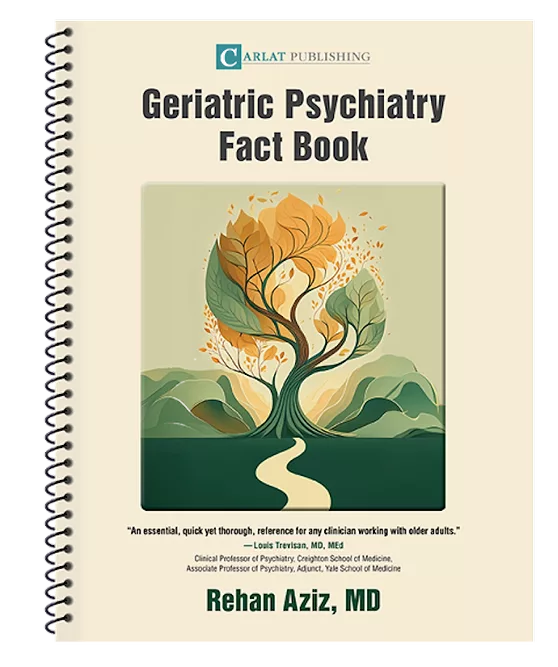“Where the f___ is my boat?”
Your patient with advanced dementia used to be a boat design expert. He taught courses. Ran a successful company. Knew hull geometry like the back of his hand.
Now he’s on your unit, yelling that he needs to get onto his boat.
He’s pointing to the bathroom.
He hasn’t owned a boat in 30 years.
We’re often told antipsychotics are a last resort for agitation in dementia. And that’s true—they are.
But when you do reach that last resort, you need to know how to use it—and how to talk about it with families.
The Carlat Geriatric Psychiatry Fact Book, just released, gives you language that’s both clear and compassionate.
Psychiatrist Dr. Rehan Aziz offers this script:
“I am concerned that [the patient] is in danger of harming themselves or others. For this reason, I am recommending an antipsychotic. One of these medications is FDA-approved for this indication. Unfortunately, all of these medications carry a small increase in the risk of death in patients with dementia. The risk is about 2.3% with sugar pills and 3.5% with these medications. So, there’s a 1–2% higher chance of death. I wouldn’t recommend [medication] unless I thought it was necessary. What are your thoughts?”
That kind of clarity is what I love about this book.
It doesn’t just say “avoid antipsychotics.”
It tells you when to use them, which ones to choose, and how to talk about it.
→ Quetiapine for Parkinson’s or Lewy body dementia?
→ Brexpiprazole for Alzheimer’s agitation?
→ Aripiprazole vs. risperidone vs. olanzapine—what’s the best fit?
It’s all in there—dosing, efficacy, side effects, and communication strategies. 202 pages of fast-access, no-fluff clinical knowledge from the team behind The Carlat Geriatric Psychiatry Report.
Built for the realities of geriatric care.
Get your copy of the book here.
Join the conversation on LinkedIn with Dr. Carlat.
- Expert Q&A: Ethical Principles and Capacity Assessment in Dementia Care with Paul S. Appelbaum, MD, The Carlat Geriatric Psychiatry Report, April 1, 2024
- Podcast Episode: Assessment and Treatment of PTSD in the Older Patient with Rehan Aziz, MD, The Carlat Psychiatry Podcast, July 24, 2023
- Expert Q&A: Managing Behavioral and Psychological Disturbances in the Nursing Home with Maureen C. Nash, MD, The Carlat Geriatric Psychiatry Report, April 1, 2024.
- Clinical Update: Mania in Older Adults, The Carlat Geriatric Psychiatry Report, January 1, 2023


_-The-Breakthrough-Antipsychotic-That-Could-Change-Everything.webp?t=1729528747)



